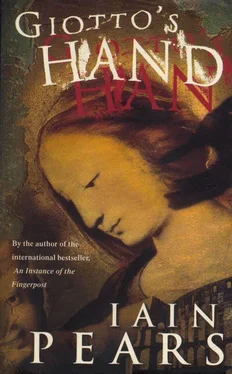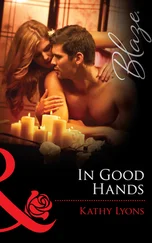Iain Pears - Giotto's Hand
Здесь есть возможность читать онлайн «Iain Pears - Giotto's Hand» весь текст электронной книги совершенно бесплатно (целиком полную версию без сокращений). В некоторых случаях можно слушать аудио, скачать через торрент в формате fb2 и присутствует краткое содержание. Город: London, Год выпуска: 1994, ISBN: 1994, Издательство: Harper Collins, Жанр: Исторический детектив, на английском языке. Описание произведения, (предисловие) а так же отзывы посетителей доступны на портале библиотеки ЛибКат.
- Название:Giotto's Hand
- Автор:
- Издательство:Harper Collins
- Жанр:
- Год:1994
- Город:London
- ISBN:978-0-00-232531-8
- Рейтинг книги:5 / 5. Голосов: 1
-
Избранное:Добавить в избранное
- Отзывы:
-
Ваша оценка:
- 100
- 1
- 2
- 3
- 4
- 5
Giotto's Hand: краткое содержание, описание и аннотация
Предлагаем к чтению аннотацию, описание, краткое содержание или предисловие (зависит от того, что написал сам автор книги «Giotto's Hand»). Если вы не нашли необходимую информацию о книге — напишите в комментариях, мы постараемся отыскать её.
Giotto's Hand — читать онлайн бесплатно полную книгу (весь текст) целиком
Ниже представлен текст книги, разбитый по страницам. Система сохранения места последней прочитанной страницы, позволяет с удобством читать онлайн бесплатно книгу «Giotto's Hand», без необходимости каждый раз заново искать на чём Вы остановились. Поставьте закладку, и сможете в любой момент перейти на страницу, на которой закончили чтение.
Интервал:
Закладка:
Bottando stole a quick glance around the room. A hit, he thought to himself, as he noticed the disapproving stares in Argan’s direction. Argan was not smiling.
“Told you,” he said in a whisper to Flavia. “Never attack an old lion till you’re sure his teeth are gone.
“Now, the more important matter of the case called Giotto,” he went on more loudly, brushing aside Flavia as she tapped him on the arm and whispered urgently that she needed a little word with him outside. Not now, Flavia, he thought. I’m enjoying myself.
“As Dottore Argan has remarked, this was for a long time only a string of vague suppositions on my part. I — my department—followed routine procedure. Unsolved crimes are reviewed at periodic intervals to see if they can be matched with new and apparently unrelated evidence. This process is where, if I may say so, experience comes in once more. To spot the possibility and to interrogate it. To see the shape of a crime. May I point out that, although Dottore Argan had full access to the original file and I understand studied it carefully, he failed to see any possibilities to be exploited.
“My experience,” he said loftily, “and the practical skill of Signorina di Stefano here, did see those possibilities.”
For some reason Signorina di Stefano was looking more distraught than proud at this tribute. She did so much wish she could get him to shut up. He’d won. Did he really need to go for total victory?
He did.
“What Dottore Argan sneered at, we looked into. What he dismissed immediately as a tissue of nonsense, we followed up and pursued. And what Dottore Argan would have consigned to the wastepaper basket, we brought to a conclusion which, I do not mind saying, I am happy to count as the most considerable of my career. If my running of the department is to be judged, then I am more than content that it should be on this case.”
This bold statement produced a nice effect; it is, after all, quite rare in the world of bureaucracy that people go so far out on a limb with such unconditional claims. Flavia, still nervous, examined the top of the table, and fiddled with her pen.
“As for the man I labelled Giotto and of whose existence Dottore Argan is sceptical, I am now in a position to add substance to my original theory. His name was Geoffrey Arnold Forster, and we can prove it. His identity was discovered because we listened to crooks and senile old women, and because we have the skill and experience to know when they are telling the truth and when they are lying.”
Proof? He went on as the questions erupted. Of course. Even if you disapproved of Sandano, there was the testimony of Signora Fancelli; Flavia had forgotten to tell him about the circumstances of its production. The statement of Arthur Winterton who, Bottando said, was renowned throughout the international art world as a dealer of the highest integrity. The testimony of Mary Verney that Forster had claimed to be selling pictures through Weller. Confirmation by Jonathan Argyll that he had not done so. His possible murder of Veronica Beaumont when she discovered how he was using the family name to trade in illegal paintings and had questioned him. The fact that his wife had burnt his papers in order to destroy evidence of his dealings. Finally, the possibility that he was himself murdered on the orders of a discontented client—although this was unlikely ever to be proven, due to the fact that it was in the hands of the English police who lacked a long-established Art Squad to investigate with skill.
Bottando paused for dramatic effect and to see how this was going down. They were all shifting uncertainly in their seats, unprepared for his vigorous self-defence. Argan, however, was looking a little relaxed once more, as he knew that so far Bottando had not produced the proof he had claimed. He was preparing to counterattack. Bottando waited until the man was licking his lips with anticipation, then smiled sweetly at him, and took out a piece of paper.
“And, above all, there is this,” he went on, putting the sheet on the table and glancing at it reverentially. He let it lie there for at least half a second, the room in silence, so that all present, even the dimmest, knew that the moment of climax was coming.
“Found in his files, again by one of my people. And what is it?” he asked rhetorically, peering around the room as though he expected hands to be raised. He shook his head as though ‘twas a mere bagatelle. All in a day’s routine.
“Just a list of his clients,” he said airily. “The paintings they bought. And the places they were stolen from. That’s all. Not complete, probably, but in my opinion one of the single greatest finds in the history of art theft. Nineteen works, twelve stolen from Italy alone, and painted by Uccello, Martini, Pollaiuolo, Masaccio, Bellini and many others. All on my list of deeds done by Giotto’s hand, in whose existence Dottore Argan refused to believe. In themselves a major collection of which any museum would be very proud. We know where they are, and we can probably get many of them back. Their identification is,” he said firmly, glancing around and daring anyone to contradict him, “a triumph for my entire department.”
Perhaps he went on a little remorselessly towards the end, but he was determined to leave nothing in doubt. He handed round the list which Flavia had bargained out of Winterton the evening before, so that all could look and admire. And as they examined, Bottando developed his variations on a theme of expertise and experience, on the dangers of thinking real life could be reduced to a flowchart of administrative responsibilities: on the need for long-term continuity, not constant change to keep up with the latest fad and fashion. On how police work is hard and time-consuming and could not be had on the cheap. On the need to be dispassionate, and not to end up defending crooks because you are related to them.
And above all, on the need for absolute and total dedication and integrity and honesty. This last with a glance in Argan’s direction.
All delivered in a gentle, regretful, calm tone, and sheer music to the ears of the police members of the committee, who were regarding him almost with veneration by the time he’d finished. The mood of the meeting was entirely reversed. Now it was Argan’s natural allies who found themselves unable to look steadily in his direction. They would be back, advocating reform, in due course. But they were not going to be shot to pieces defending a man who had so rashly led them into an ambush.
Bottando’s vote of confidence was unanimous. Oddly, only Flavia still seemed unhappy. It must be the strain of it all, Bottando thought. It would take her a few days to recover, and for it to sink in what an extraordinary job she’d done.
Even Argan congratulated him on a fine piece of work. Bottando almost felt sorry for him.
Well, not really.
17
Bottando’s triumph was Jonathan Argyll’s nightmare. When Flavia left him at Norwich railway station, he’d been feeling quite content. He had, in his opinion, given good, if unorthodox, advice, the result of thinking through a process in a fashion that would end up to everyone’s advantage. He had been quick, ruthless and decisive as recommended by all and sundry. He felt a little uncomfortable with this new and thrusting persona, but had no doubts that he would get used to it. Now all that remained was to transfer it to his job as a dealer and everything would be delightful. Soon he would have to talk to Mary Verney about the Leonardo. The mood lasted all the way back to Weller House, accompanied him to bed and sent him off to an exceptionally good sleep.
It did not, however, last very long in the morning; survived until he was halfway through his morning egg, in fact, at which point Mary Verney stuck her head through the door and summoned him to the telephone.
Читать дальшеИнтервал:
Закладка:
Похожие книги на «Giotto's Hand»
Представляем Вашему вниманию похожие книги на «Giotto's Hand» списком для выбора. Мы отобрали схожую по названию и смыслу литературу в надежде предоставить читателям больше вариантов отыскать новые, интересные, ещё непрочитанные произведения.
Обсуждение, отзывы о книге «Giotto's Hand» и просто собственные мнения читателей. Оставьте ваши комментарии, напишите, что Вы думаете о произведении, его смысле или главных героях. Укажите что конкретно понравилось, а что нет, и почему Вы так считаете.












